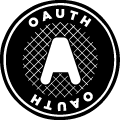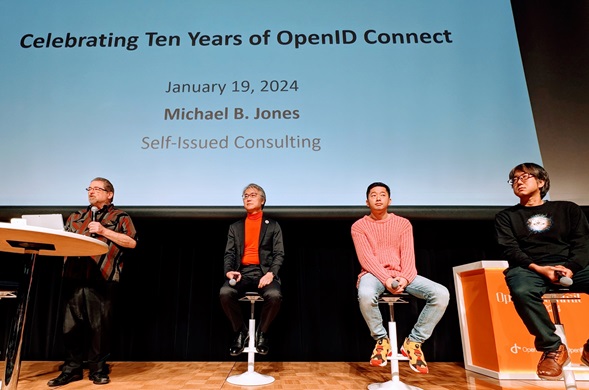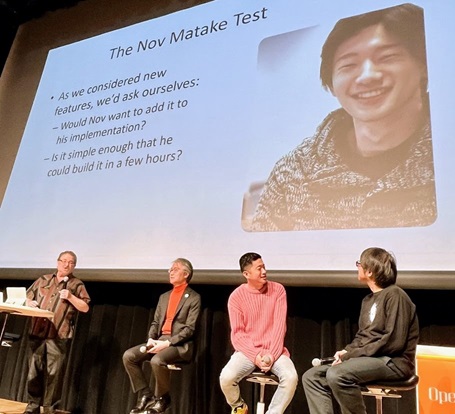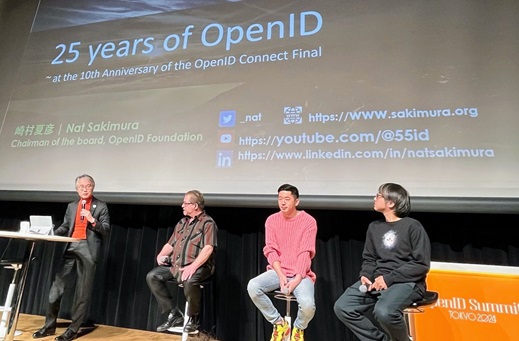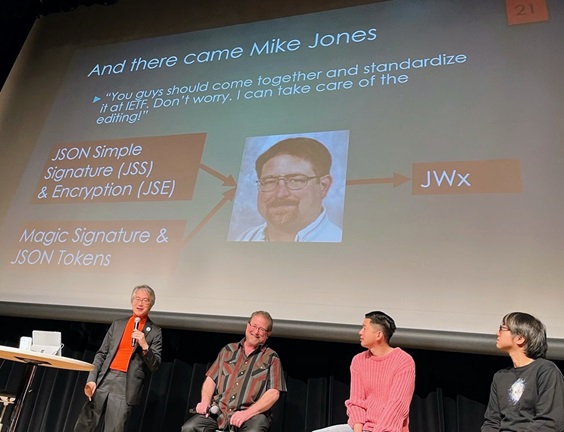 Thanks to those of you who elected me to a two-year term on the OpenID Foundation board of directors. This is an incredibly exciting time for the OpenID Foundation and for digital identity, and I’m thrilled to be able to contribute via the OpenID board. Thanks for placing your trust in me!
Thanks to those of you who elected me to a two-year term on the OpenID Foundation board of directors. This is an incredibly exciting time for the OpenID Foundation and for digital identity, and I’m thrilled to be able to contribute via the OpenID board. Thanks for placing your trust in me!
I’d like to also take this opportunity to congratulate my fellow board members who were also elected: George Fletcher, Atul Tulshibagwale, and Mark Verstege. See the OpenID Foundation’s announcement of the 2024 election results.
My candidate statement was:
I am on a mission to build the Internet’s missing identity layer. OpenID specifications and initiatives are key to realizing that vision.
Widespread deployment of OpenID specifications has the potential to make people’s online interactions more seamless, secure, and valuable. I have been actively working since 2007 to make that an everyday reality.
2024 has huge potential for advances in digital identity. People are starting to have identity wallets holding digital credentials that they control. National and international federations are being established. Open Banking and Open Finance deployments are ongoing. Adoption of OpenID Connect (which we created a decade ago!) continues going strong. We’re on track to have OpenID Connect be published as ISO standards. OpenID specifications and programs are essential to all these outcomes.
While many of you know me and my work, here’s a few highlights of my contributions to the digital identity space and the OpenID community:
– I was primary editor of OpenID Connect, primary editor of the OAuth 2.0 bearer token specification [RFC 6750], and primary editor of the JSON Web Token (JWT) specification [RFC 7519] and the JSON Object Signing and Encryption (JOSE) specifications [RFCs 7515-7518], which are used by OpenID Connect. I was an editor of the Security Event Token specification [RFC 8417], which is used by Shared Signals and OpenID Connect. I’m an editor of the SIOPv2 specification and a contributor to the other OpenID for Verifiable Credentials specifications. I’m an editor of the OpenID Federation specification. The OAuth DPoP specification [RFC 9449] was my latest RFC. I’m an author of 32 RFCs and 17 final OpenID specifications, with more of each in the pipeline.
– I spearheaded creation of the successful OpenID Connect certification program and continue actively contributing to its success. Over 2,800 certifications have been performed and the pace keeps increasing! Certification furthers the Foundation’s goals of promoting interoperation and increasing the quality of implementations. It’s also become an important revenue stream for the Foundation.
– My contributions to the Foundation have included serving on the board since 2008, serving as board secretary during most of my tenure. I’ve helped organize numerous OpenID summits and working group meetings and regularly present there. I chaired the election committee that developed the Foundation’s election procedures and software. I co-chaired the local chapters committee that developed the policies governing the relationships with local OpenID chapters around the world. I serve on the liaison committee, facilitating our cooperation with other organizations. And way back in 2007, I worked with the community to create the legal framework for the OpenID Foundation, enabling both individuals and corporations to be full participants in developing OpenID specifications and ensuring that they can be freely used by all.
I’d like to continue serving on the OpenID board, because while the OpenID community is having notable successes, our work is far from done. Taking it to the next level will involve both additional specifications work and strategic initiatives by the Foundation. We need to continue building a broad base of supporters and deployers of OpenID specifications around the world. We need to continue fostering close working relationships with partner organizations. And we need to continue safeguarding OpenID’s intellectual property and trademarks, so they remain freely available for all to use.
I have a demonstrated track record of energetically serving the OpenID community and producing results that people actually use. I plan to continue taking an active role in making open identity solutions even more successful and ubiquitous. That’s why I’m running for a community board seat in 2024.
Mike Jones
michael_b_jones@hotmail.com
Blog: https://self-issued.info/
Professional Website: https://self-issued.consulting/
 The OpenID Federation editors were invited to give a presentation on OpenID Federation at the 18th FIM4R Workshop, which was held at the 2024 TIIME Unconference. Giuseppe De Marco, Roland Hedberg, John Bradley, and I tag-teamed the presentation, with Vladimir Dzhuvinov also participating in the Q&A. Topics covered included motivations, architecture, design decisions, capabilities, use cases, history, status, implementations, and people.
The OpenID Federation editors were invited to give a presentation on OpenID Federation at the 18th FIM4R Workshop, which was held at the 2024 TIIME Unconference. Giuseppe De Marco, Roland Hedberg, John Bradley, and I tag-teamed the presentation, with Vladimir Dzhuvinov also participating in the Q&A. Topics covered included motivations, architecture, design decisions, capabilities, use cases, history, status, implementations, and people.

